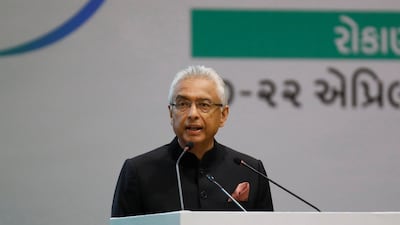A British doctor is helping to set up a national colon cancer screening programme in Mauritius due to hundreds of deaths.
Dr Sulleman Moreea was approached by officials from the Indian Ocean island nation, where he was born and brought up, to look at how officials could establish a colon cancer screening service within the country’s existing facilities.
It follows a rise in cases and hundreds of deaths.
Colorectal cancer is the second most common cancer in men in Mauritius and the third most common in women and currently has a 50 per cent mortality rate.
The disease was brought to the fore this weekend when it emerged Brazilian football star Pele was battling colon cancer.
The 82-year-old said in an Instagram post that he wanted to keep "everyone calm and positive" after a medical report showed he remained in stable condition.
Dr Moreea, who is a consultant gastroenterologist at Bradford Teaching Hospitals, in West Yorkshire, is now creating the £500,000 ($614,300) a year programme and has been single-handedly training all the island's doctors in identifying the illness.
"I started training doctors in Mauritius in endoscopy in 2008 as the service didn’t exist on the island before then. I began teaching in one hospital but there are five hospitals in Mauritius so it wasn’t a quick process," he said, according to Bradford Teaching Hospitals NHS Foundation Trust.
"Since then I’ve returned home frequently to train the island’s doctors and we have now got to a position where we have developed endoscopy units at all five hospitals, with trained doctors able to carry out procedures, so we now have a good service."
His training has enabled doctors to increase the number of endoscopies carried out from just 250 in 2008 to 6,000 last year.
He discovered that experts had noticed an increase in colon cancer with a 50 per cent mortality rate and realised a national screening programme was urgently needed so cases could be picked up early.
However, at the time the country did not have enough highly trained endoscopists or units set up to launch it.
"By 2021 I felt the island’s doctors were sufficiently proficient to be ready to start setting up a colon cancer screening which will help catch bowel cancer in the early stages when it is treatable and potentially curable," Dr Moreea said.
"I was asked how to go about this and I said ‘the UK has a marvellous system and we should invite experts form the UK to come and share their knowledge and advise the island on how to proceed’.
"I set up a conference where I asked five other NHS experts, who are big hitters in the UK regarding colon cancer screening, to come and help me advise the government on how to do this and they graciously came. They came in their own time and out of the kindness of their hearts and I am forever grateful to them.
"We are now in a position where the first generation of endoscopists are now teaching new doctors in this skill, which is a good place to be."
The six-person UK delegation included the Director of the South of England Screening Hub, Sally Benton, Professor of Health Data Epidemiology at the University of Oxford, Eva Morris, along with staff from other UK health trusts.
A two-day conference took place in September and brought together 100 dignitaries, including the Prime Minister of Mauritius, and representatives from the country’s health service and government, including doctors, biochemists, healthcare managers and civil servants.
Each member of the UK delegation presented on different elements of the colon screening programme in England and spent a further day visiting local hospitals to see the how the current endoscopy facilities could be best implemented in a new colon cancer screening service.
The UK experts have now written a detailed report which has been sent to island’s cabinet to approve.
"A screening service will cost around £500,000 a year to run but it is felt a good investment to prevent colon cancer happening in the future," Dr Moreea said.
"The UK has taken about 50 years to get the system right and we hope to achieve the same position in just five years in Mauritius.
"The government will take 12 months to set up the whole pathway of screening by getting to the position where we will screen the first patient in November 2023. The team remains committed and available for advice on ongoing basis and I am very grateful to them.
"I will continue to be involved as an adviser as it gives me enormous pleasure to be able to translate the knowledge that I have gained here in an advanced country and give it back to my homeland. It is fantastic co-operation and it stops people from dying — 50 per cent are dying currently — and it is a completely preventable disease."
Bowel cancer is the second most common cause of cancer death in the UK, accounting for 10 per cent of all cancer deaths.
Since the early 1970s, bowel cancer mortality rates have decreased by almost half (45 per cent) in the UK.
"Bowel cancer is treatable and curable especially if diagnosed early. Nearly everyone survives bowel cancer if diagnosed at the earliest stage. However, this drops significantly as the disease develops. Early diagnosis really does save lives," Bowel Cancer UK said.
More than 16,500 people die from bowel cancer in the UK every year.


